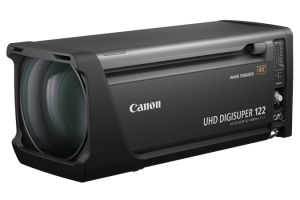ESPN Checks Out New Canon UHD-DIGISUPER 122 Lens
Additional throw, a wider shot expand production options
Story Highlights
ESPN got its hands on the new Canon UHD-DIGISUPER 122 (UJ122x8.2B) lens for this past Saturday’s ESPN College Football Saturday Primetime matchup between the University of Michigan and Penn State. The production team had a chance to try it out at two locations — a main game camera and the low–end-zone camera — on the night before the game, and, although the lens showed benefits in both positions, the latter won the day by the time the game started.
“We decided to put it on the low–end-zone camera, and I really like it,” says director Derek Mobley. “It’s wider and can get a lot tighter than anything else on the market. It’s every bit as good as the Canon 95X lens but is wider and has more throw.”
The lens, which debuted at September’s IBC 2018 in Amsterdam, has a field of view that is 60.7 degrees by 36.5 degrees at 8.2mm and 0.55 degrees by 0.31 degrees at 1,000mm. Maximum aperture is 1:1.7 at 8.2 at 340mm and 1:5.0 at 1,000mm.
Game Creek’s 79 remote-production unit is at the center of ESPN’s Saturday primetime show, and the team relies heavily on Canon 95X lenses as well as two 95X telephoto lenses.
The camera operators located in the low–end-zone position typically shoot across the field and capture shots of the offense moving toward them. The combination of additional throw and a wider shot expands production options.
“The guys in the end zone pretty much shoot the quarterback’s face],” notes Mobley. “They can be 120 yards away [shooting across the field. With the 122X, they were able to get really tight shots and still have some extra zoom.”
The wider image also allows the camera operator to shoot action on the back line of the end zone and get the player from head to toe as well as the ball in the shot.
According to Mobley, the lens didn’t lose any light coming into the lens, and, even with a 2X extender, it was still able to get a lot of great shots. “We had some stops to go,” he says, “so it isn’t like we were wide open.”
He notes that the combination of wide and long adds versatility to other camera positions as well, and he thinks the lens can make a difference in nearly every show. At a main camera position, for example, the wide shot is perfect for shooting wide shots of the stadium or arena while also being able to zoom in on coaches’ faces. For baseball, it could be placed down the line and get wide panning shots of the ground and can also shoot in tight and capture a third baseman making a diving catch.
The lens is now heading back to Japan for the annual Inter BEE broadcast convention Nov. 14-16 in Tokyo.

